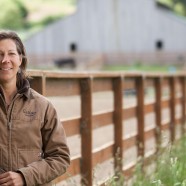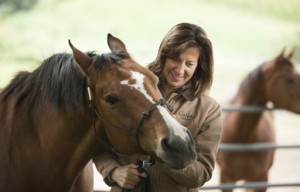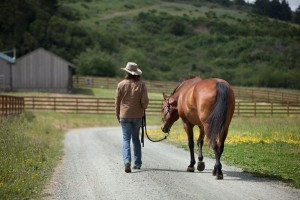
“Horse” was the first word that Wendy Millet ’86 ever spoke, according to family legend. This beginning could not have been more fitting.
Wendy says “horse” a lot these days. A Northern California resident by way of Boston, upstate New York, Montana, Wyoming, Seattle, Washington D.C., and Los Angeles, Wendy loves horses, and her consequent desire to help connect people with nature, has led her to a career in conservation, ranching and personal development.
Wendy’s primary job is director of TomKat Ranch’s Educational Foundation, where she is responsible for overseeing the daily activities of a working cattle ranch and developing educational programs on sustainable agriculture. The ranch, named for owners Tom and Kat Steyer, operates in the hills of Pescadero, about 45 miles south of San Francisco. Its cattle operation, Left Coast Grassfed, provides 100 percent grass-fed, grass-finished beef, and takes pride in its extensive efforts to care for the land and animals while providing a healthy local product for local consumers.
 A concise, clear-cut description for Wendy’s job on the ranch is elusive. Her days may be spent working with staff developing a new educational venture, consulting with the ranch’s onsite ecologist tracking ecological processes and progress, or figuring out the best way to get the ranch’s beef to the local farmers market. Every day is full of opportunities and challenges, and then there are her favorite days—out on horseback moving cattle.
A concise, clear-cut description for Wendy’s job on the ranch is elusive. Her days may be spent working with staff developing a new educational venture, consulting with the ranch’s onsite ecologist tracking ecological processes and progress, or figuring out the best way to get the ranch’s beef to the local farmers market. Every day is full of opportunities and challenges, and then there are her favorite days—out on horseback moving cattle.
If her roles as ranch manager, educator and part-time cowgirl aren’t enough, Wendy also runs a company she co-founded some years ago thanks to her passion for horses. The company, called Gallop Ventures, is a transformative equine-based teamwork and leadership business focused on helping people “find their stride.” While nobody actually rides the horses, participants gain unexpected insights about themselves and how they interact with the world. Described as a sort of “ropes course with horses,” Gallop Ventures is inspired by the belief that when people connect with themselves and others (both people and horses), they, in turn, may be inspired to contribute to a more connected and caring world.
While Wendy’s love for horses and the natural world started in early childhood, her desire to pursue a career in ranching conservation began during an undergraduate summer working on a dude ranch in Wyoming. While there she encountered cowboys and cowgirls and remembers thinking: “I love this way of life, the commitment to the land and the passion for animals. The respect for natural systems really inspired me.”
Cowboys may have seemed an unconventional circle of
colleagues for the Harvard literature major, but Wendy, a self-
described “Transcendentalist fan,” didn’t necessarily see the inconsistencies. While college summers were spent wrangling horses off a Montana mountainside, the rest of the year included long nights at school reading Emerson, Thoreau and Muir, all of whom wrote extensively about transformative experiences in nature. (It was in Milton’s tenth-grade English class that she first learned about Thoreau’s two-year immersion in the woods surrounding Walden Pond.)
 Subsequent summers ranching in the West, and inspired by the concept of Milton’s Mountain School, Wendy began to envision sharing her love of horses, nature and ranch life to inspire others. Nobody knew how serious she was about this dream. She remembers meeting with a financial counselor in 1995 and six months into her marriage to discuss the future, “When I piped in that we needed to remember to plan for “the ranch,” I remember dumbfounded stares from them both, but my mind was made up,” she smiles.
Subsequent summers ranching in the West, and inspired by the concept of Milton’s Mountain School, Wendy began to envision sharing her love of horses, nature and ranch life to inspire others. Nobody knew how serious she was about this dream. She remembers meeting with a financial counselor in 1995 and six months into her marriage to discuss the future, “When I piped in that we needed to remember to plan for “the ranch,” I remember dumbfounded stares from them both, but my mind was made up,” she smiles.
For Wendy, immersion in the natural world has been more than a two-year experiment; it has been a conscious commitment and passionate undertaking. She has worked for the Nature Conservancy, the Conservation Fund, Stanford’s Woods Institute for the Environment, and several local land trusts, and she serves on the board of the California Council of Land Trusts and Save the Redwoods League.
“Many people don’t understand the way that everything is connected,” says Wendy, “the way that we care for ourselves, our land, our community, the animals—it’s all connected. The choices that we make matter in every moment.”
–Ryan Eshoff and Wendy Millet



